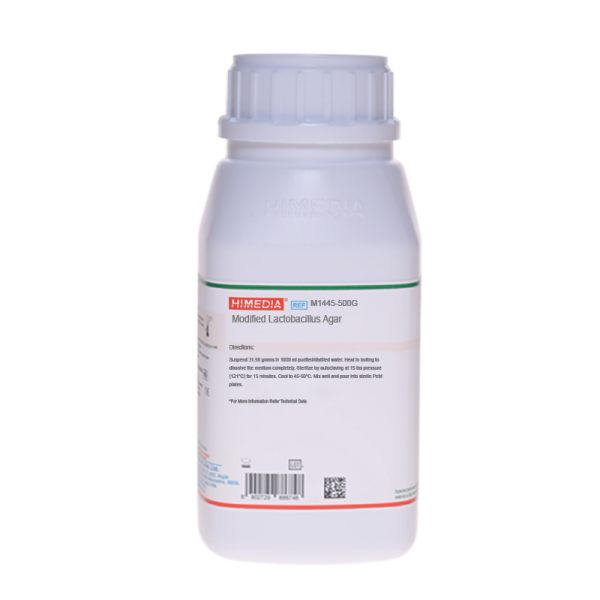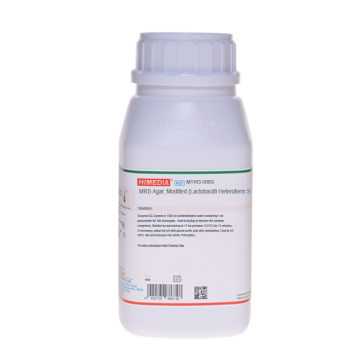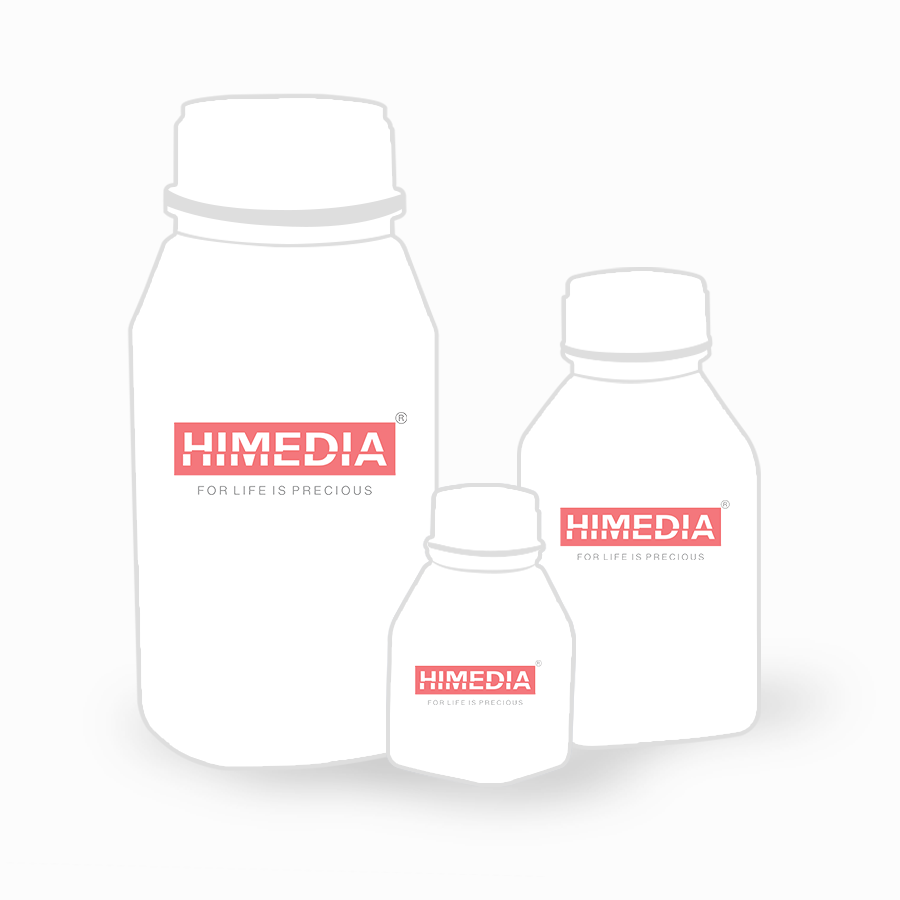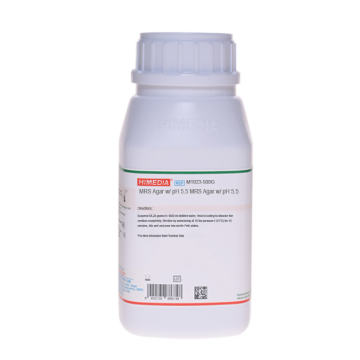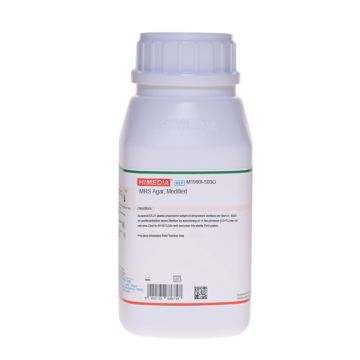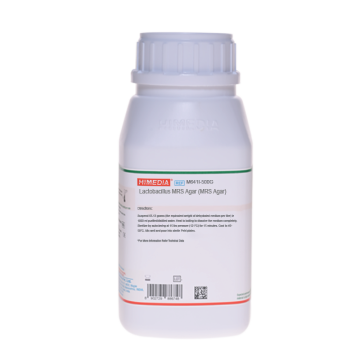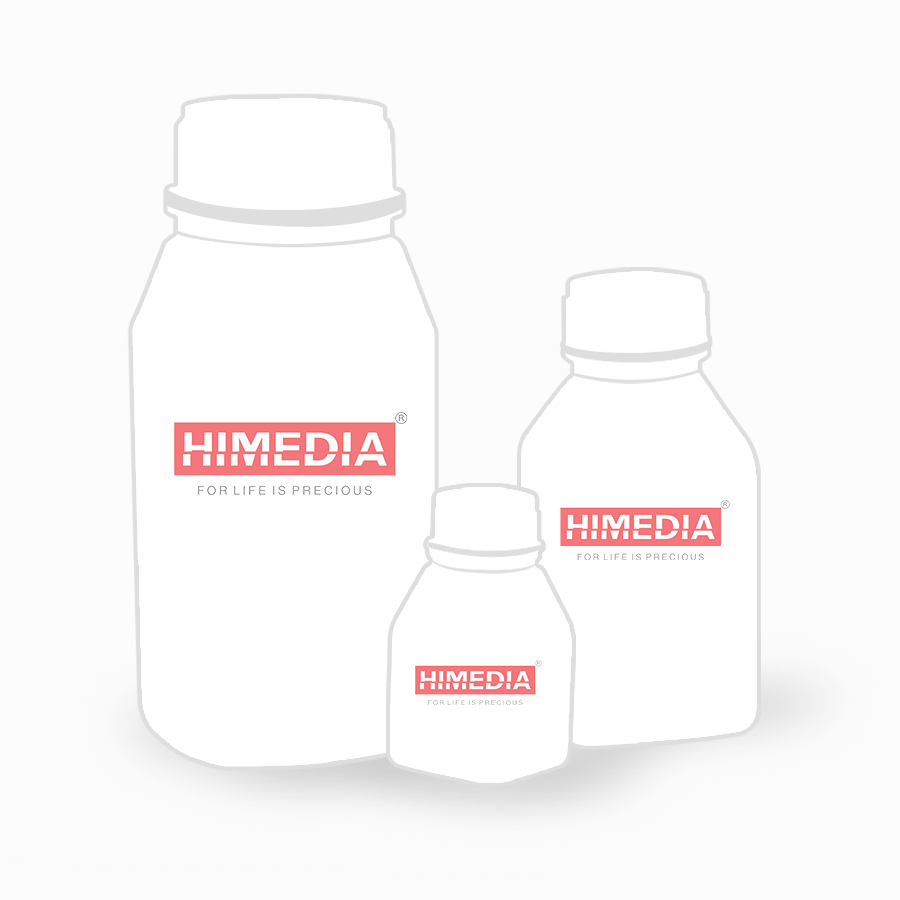 Your enquiry has been submitted
Your enquiry has been submitted
Modified Lactobacillus Agar
Intended Use
Recommended for isolation and enumeration of Lactobacilli.
Composition
| Ingredients | g/L |
|---|---|
| Yeast extract | 5.000 |
| Dextrose (Glucose) | 5.000 |
| Tryptone | 5.000 |
| Potassium dihydrogen phosphate | 0.500 |
| Dipotassium hydrogen phosphate | 0.500 |
| Magnesium sulphate | 0.300 |
| Ferrous sulphate | 0.100 |
| Sodium chloride | 0.050 |
| Manganese sulphate | 0.100 |
| Copper sulphate | 0.010 |
| Zinc sulphate | 0.010 |
| Cobalt sulphate | 0.010 |
| Agar | 15.000 |
Final pH (at 25°C): 6.0±0.2
**Formula adjusted, standardized to suit performance parameters
Directions
Suspend 31.58 grams in 1000 ml purified/distilled water. Heat to boiling to dissolve the medium completely. Sterilize by autoclaving at 15 lbs pressure (121°C) for 15 minutes. Cool to 45-50°C. Mix well and pour into sterile Petri plates.
Principle And Interpretation
Modified Lactobacillus Agar is used for isolation and enumeration of Lactobacilli from oral specimens, faecal specimens, food and dairy products (1).
Tryptone supply nitrogenous and carbonaceous sources, long chain amino acids, vitamins and other essential growth nutrients Yeast extract provides vitamin B complex and dextrose is the fermentable carbohydrate and energy source. The phosphate provide buffering action and sodium chloride maintains osmotic balance.
Type of specimen
Clinical samples - Oral speciemen; Faeces; Food and dairy samples
Specimen Collection and Handling
For clinical samples follow appropriate techniques for handling specimens as per established guidelines (2,3). For food and dairy samples, follow appropriate techniques for sample collection and processing as per guidelines (4,5). After use, contaminated materials must be sterilized by autoclaving before discarding.
Warning and Precautions
In Vitro diagnostic use. For professional use only. Read the label before opening the container. Wear protective gloves/ protective clothing/eye protection/face protection. Follow good microbiological lab practices while handling specimens and culture. Standard precautions as per established guidelines should be followed while handling clinical specimens. Safety guidelines may be referred in individual safety data sheets.
Limitations
- Further biochemical and serological tests must be carried out for further identification.
Performance and Evaluation
Performance of the medium is expected when used as per the direction on the label within the expiry period when stored at recommended temperature.
Quality Control
Appearance: Cream to yellow homogeneous free flowing powder
Gelling: Firm, comparable with 1.5% Agar gel
Colour and Clarity of prepared medium: Yellow clear to slightly opalescent with slight suspended particles
Reaction: Reaction of 3.16% w/v aqueous solution at 25°C. pH: 6.0±0.2
pH: 5.80-6.20
Cultural Response
Cultural characteristics observed in presence of Carbon dioxide (CO2)after an incubation at 35-37°C for 48 hours.
| Organism | Growth |
|---|---|
| Lactobacillus acidophilus ATCC 4356 (00098*) | luxuriant |
| Lactobacillus plantarum ATCC 8014 | luxuriant |
Key: * Corresponding WDCM numbers.
Storage and Shelf Life
Store between 10-30°C in a tightly closed container and the prepared medium at 20-30°C. Use before expiry date on the label. On opening, product should be properly stored dry, after tightly capping the bottle in order to prevent lump formation due to the hygroscopic nature of the product. Improper storage of the product may lead to lump formation. Store in dry ventilated area protected from extremes of temperature and sources of ignition. Seal the container tightly after use. Product performance is best if used within stated expiry period.
Disposal
User must ensure safe disposal by autoclaving and/or incineration of used or unusable preparations of this product. Follow established laboratory procedures in disposing of infectious materials and material that comes into contact with clinical sample must be decontaminated and disposed of in accordance with current laboratory techniques (2,3).
Reference
- deMan J, Rogosa M and Shape M., 1960. J Appl. Bacteriol., 23:130.
- Isenberg, H.D. Clinical Microbiology Procedures Handbook 2nd Edition.
- Jorgensen, J.H., Pfaller, M.A., Carroll, K.C., Funke, G., Landry, M.L., Richter, S.S and Warnock., D.W. (2015) Manual of Clinical Microbiology, 11th Edition. Vol. 1.
- Salfinger Y., and Tortorello M.L. Fifth (Ed.), 2015, Compendium of Methods for the Microbiological Examination of Foods, 5th Ed., American Public Health Association, Washington, D.C.
- Wehr H. M. and Frank J. H., 2004, Standard Methods for the Microbiological Examination of Dairy Products, 17th Ed., APHA Inc., Washington, D.C.
| Product Name | Modified Lactobacillus Agar |
|---|---|
| SKU | M1445 |
| Product Type | Regular |
| Physical Form | Powder |
| Origin | Animal |
| Packaging type | HDPE |
| References | 1.deMan J, Rogosa M and Shape M., 1960. J Appl. Bacteriol., 23:130. |
| Customized Product Available | No |



